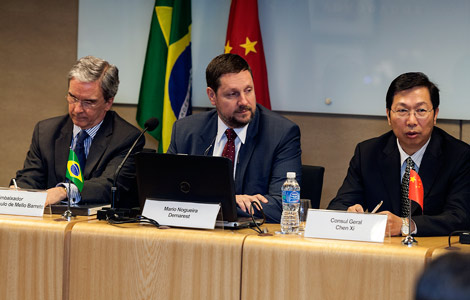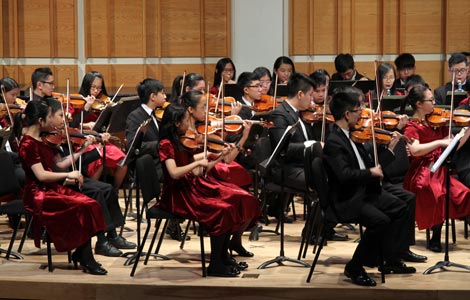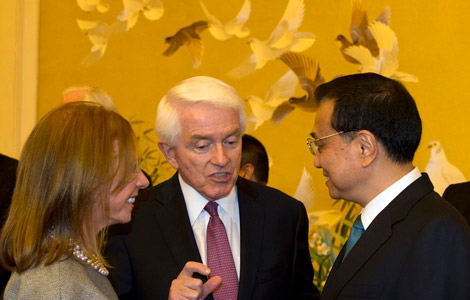Xi: Respect cyber-space sovereignty
Updated: 2014-07-17 09:52
By WU JIAO in Brasilia and ZHAO SHENGNAN in Beijing (China Daily Latin America)
|
||||||||
Chinese leader stresses increasing responsibilities of emerging nations
Chinese President Xi Jinping called for respect of a country's cyber-space sovereignty on Wednesday, telling the Brazilian congress that"there are no double standards in the information sector and every country has the right to preserve its own information security".
Xi remarks were made against the backdrop of continuing revelations about extensive spying by the United States on other countries, including China, Brazil and Russia and even some US allies.
During the 30-minute speech, Xi said the Internet's rapid development poses new challenges to the sovereignty, security and interest of a country, and should be handled seriously.
Although the Internet is highly globalized, the sovereignty of the information sector of every country should not be violated, Xi said.
"No matter how developed a country's Internet technology is, it just cannot violate the information sovereignty of other countries".
There also should not be a scenario of one country or some countries having a secure Internet, while the others don't, according to Xi, adding that a country cannot pursue its own Internet security at the price of threatening the security of other countries.
Xi called on the international society to jointly establish a peaceful, secure, open and cooperative cyber space through effective cooperation, and to establish a global cyber-space governance system featuring multilateral cooperation, democracy and transparency.
The statement on cyber-space sovereignty is part of Xi's emphasis for both China and Brazil, as two important emerging economies, to take on more international responsibility.
Brazilian President Dilma Rousseff canceled a planned state visit to the US last year after documents provided by former US intelligence contractor Edward Snowden revealed that the US National Security Agency had intercepted her personal e-mails and targeted the communications of Petrobras, the Brazilian state oil company.
Rousseff sponsored a debate about online spying at the UN General Assembly, which ended in December with the adoption of a resolution reaffirming the right to Internet privacy.
In the just-concluded BRICS summit of leaders from Russia, China, Brazil, India and South Africa, a joint declaration issued on Tuesday said the five countries agree that"it is necessary to preserve the information and communication technologies, particularly the Internet, as an instrument of peace and development and to prevent its use as a weapon."
Russia has proposed a BRICS agreement on cooperation in the field.
Joao Nogueira, former president of the Institute of International Relations of Pontificia Universidade Catolica do Rio de Janeiro, said:"It is a very important moment for President Xi Jinping to mention this issue in the BRICS summit because it can help to push the situation ahead and Brazil is in line with China's stand."
Nogueira said it is important to build a more multilateral-governance of the Internet such as introducing the United Nations into the system."Xi's words can urge the related parts to further the negotiations and discuss all the issues involved,"he added.
Xi also raised in his speech China's willingness to strengthen ties with Brazil and other Latin American countries.
"China is willing to join efforts with Brazil and other Latin American countries to become good partners that make progress together," he said.
Xi will meet leaders from the Latin American and Caribbean countries on Thursday and hold bilateral talks with Rousseff.
The leaders are expected to announce the establishment of the China-CELAC (Community of Latin American and Caribbean States) Forum.
Xu Yicong, former Chinese ambassador to Argentina, said some Latin America countries' economies have encountered difficulties recently, and they are committed to strengthening overseas cooperation.
China is one of the top choices for such cooperation because its increasing investments would improve Latin American countries' infrastructure and boost employment, and it has never interfered in other nations' internal affairs, Xu said.
Frequent visits to the region by Chinese leaders have shown the importance that Beijing attaches to the region, and the establishment of the China-CELAC forum will give inject impetus to their ties, said Xu.
Zhang Fan contributed to this story.

 Brazil launches China desk to handle economic ties with China
Brazil launches China desk to handle economic ties with China
 NY Wheel reels in Chinese EB-5 investors
NY Wheel reels in Chinese EB-5 investors
 The Penguins of Madagascar to enter China
The Penguins of Madagascar to enter China
 Panda cub Bao Bao turns one
Panda cub Bao Bao turns one
 HK kid's symphony returns to NY
HK kid's symphony returns to NY
 China, US reach agreement
China, US reach agreement
 40 bodies from jet returned to Dutch soil
40 bodies from jet returned to Dutch soil
 Dance troupe's fusion performance wins over judges
Dance troupe's fusion performance wins over judges
Most Viewed
Editor's Picks

|

|

|

|

|

|
Today's Top News
Manufacturing hits an 18-month high
Transformers producers hit with breach of contract suit
US chipmaker to be deemed monopoly
Chinese still seek Beckel termination
One dead in shooting in Philadelphia
France: Air Algerie plane 'probably' crashed
TransAsia crash while landing in Taiwan
China, UC-Davis set up food safety center
US Weekly

|

|






